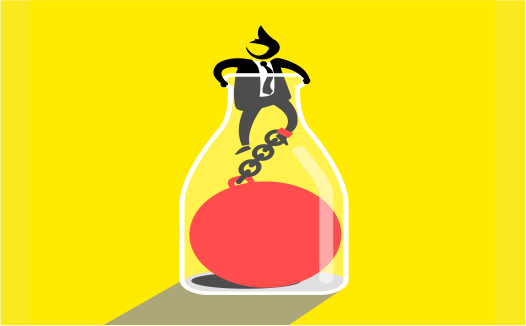The #1 Bottleneck in Sales Effectiveness. What is it?

Some of the most common bottlenecks in Sales Effectiveness have been languishing in the Sales Problems folder in our Macs for quite some time now. If you ask any Sales Representative, he will nod his head in approval at us have been able to pinpoint a number of his concern areas. It is important to address each of these concerns one by one. But more important is to prioritize them. This will help us raise the Sales Effectiveness quotient a few notches higher. As it is said, a problem well identified is half done. So, topping the charts of the Sales Effectiveness Bottlenecks is a ‘Dearth of qualified leads.’ Problem #1: Dearth of total leads, which leads to a dearth of qualified leads Solution #1 To address the first, something needs to be done to increase the number of leads. The marketing team needs to focus on getting more leads, ramping up the pipeline by analyzing the current promotion mix, the spends, the spend to media ratio, the spend to lead generation ratio and so on. The team needs to do a thorough analysis on: Is our media mix right? Is our content right? Are we reaching the target audience at the right time in the right place? The analysis will throw up a lot of opportunities for improving the promotion process. This should then sort out the lead generation process for some time. OR Problem #2: Lack of a process that qualifies or disqualifies leads based on their quality. Lack of a Lead Quality Controller or a Lead Qualifier. Solution #2 This problem is more quality-based; it says that the leads that are going to sales from the marketing team are not qualified leads. This is a bigger problem and is disturbing many organizations. The leads may be good in numbers, but when measured for their ‘fit’ to the defined ‘lead’, they drastically fall short. Marketing and Sales are usually caught in a crossfire as to whose mandate this is. To resolve the issue, it is important to plant a person or a small team that acts as a Lead Qualifier. This team or person should go through the leads generated and qualify or disqualify them based on some predefined parameters. This will go a long way in helping the Sales team to save time spent on poor leads and invest time in nurturing the qualified leads, leading them closer to conversion. This will clearly help in boosting Sales Effectiveness for the organization. If you like this blog, do read about our sales transformation blog to drive business growth in 2021.
Sales Operations Demystified – Part 2

In the last blog, we saw how Sales Operations as a function was clearly misunderstood. There we read about the first two points that demystified Sales Operations. In this blog, we will read about the other 2 points that help us in understanding the role that Sales Operations plays in the Sales Organization. Helping in building a high-performance Sales Organization and Working on improving team efficiencies and execution Helping in building a high-performance Sales Organization The Sales Operations needs to work on an organizational structure that works smoothly and effectively as well as efficiently to help the sales team to deliver to its targets. Below is how the Sales Operations can make a difference. Hiring the right people: The kind of people you recruit and allow to walk in through your door can make or break your sales team and their performance. Highly self-motivated people, open-minded learners and star performers can make a world of difference, but morale -breakers can ruin the performance of an existing team too. Sales Operations needs to work with HR on laying down some good hiring practices, using some key evaluation tools to ensure you are hiring the right guys. Allocating Territories: Allocating territories can be a crucial function of Sales Operations. They need to measure the richness of territories for the opportunity, logistically correct allocation, vertical-wise allocation and a number of such permutations and combinations for the best performance. The key is to balance territories for opportunity and impact. Incentive Planning: The backbone of sales is the incentive plans. Sales are driven by incentives, this is their drive, their charge. Sales Operations needs to plan their compensation, incentives, rewards in a way that keeps them secure as well as charged to deliver. The recognition needs to be built-in too and frequencies of such programs need to be planned so as to keep the sales team motivated and positive at all times. Communications: Nothing positive can happen without communication. Sales Operations needs to keep communication flowing in and out – to ensure that the organizations’ best practices, wins, and even challenges are communicated; while ensuring feedback flows in. This helps positive action and results. Team Efficiency and Execution Sales Operations works to ensure that the sales team is spending the maximum time on building the sales portfolio. Certain things need to be taken care of towards achieving this. Inside-Out Communication: Salespeople may often get uneasy or not bothered about communicating externally or internally. They are far too focused on their core job of selling. But communication is an important part of selling and hence the sales operations team needs to look at tools that help the sales team communicate at the right time in the right way to the right people. These could be guidelines, certain templates and more, built to help them across the selling process. Bottlenecks in Processing: Sales Operations need to frequently assess, identify and correct bottlenecks in the sales process. Are the proposals, contracts going out on time, is there a check on them? These bottlenecks once removed, help in meeting the deliveries as promised while helping avoid irate customers and losing sleep and valuable time in pacifying them. Using the CRM: Sales Operations can work on helping the sales team to use the CRM to create value for the prospects. However, what is seen is that the Sales Operations spend a lot of their time in making the sales team comply with the filling in and following other to-dos about the CRM and other procedures. This can be avoided and will only help in smoothening the sales process. Time Management: Automating routine tasks and setting procedures that allow the sales team to focus more on their core area- sales, rather than getting stuck in administrative work is a matter of time management. This is where Sales Operations can help. Tools and Technologies: Sales Operations should be on the lookout for tools and technologies that can help streamline the sales process and help the sales team in managing the sales process better. Sales operations as we have seen in this blog and the earlier blog is a lot more than pure execution. It involves a lot of proactive work, strategizing, planning, as well as bridging the gap between leadership and execution.
Sales Operations Demystified – Part 1

Sales Operations are often misunderstood as that part of the sales functional structure that only focuses on the execution part. Operations as a word inherently seem to exclude strategic thinking. But seen from up close, Sales Operations not only ensures that the sales organization runs smoothly, but also plans for it; it works to see that the sales team delivers, it makes the necessary improvements as and when required and helps in scaling up the entire process smoothly. Sales Operations actually are all of what we just said and maybe even more. As Amanda O’Neill, Director of Sales Operations at AT&T puts it, “Sales Operations describes a cross-functional role that guides customers through introductory training, provides support through the sales lifecycle, and enables long-term account sustainability.” We have broken down the main facets of the Sales Operations role into 4 points, here. Setting the Sales Strategy Working towards creating Sales Excellence Helping in building a high-performance Sales Organization and Working on improving team efficiencies and execution Let’s talk about the first two points of detail and in the ensuing blog, we will talk about the latter two in detail. Setting the Sales Strategy Sales Operations is not just about the ‘doing’ or ‘execution’. It is also the setting of the ‘How to do it’ that we call as ‘strategy’. The setting of the Sales Strategy has some key elements we need to know. Here they are: Working on an effective Go-To-Market Model This model is a product of various functions coming together to zero in on the best model there can be, for that product, market, and organization. Sales Operations as a functional expert is a key player in determining and assessing the go-to-market model. What will be the friction element in the models that are being discussed, how likely will the model work as far as buyer interest is concerned? This data is best sourced from Sales Operations, thanks to their years of experience in sales organization management. Evaluation of Sales Methodologies Sales Operations Team is the team that has actually worked on the execution of the Sales Methodology. So they can play an active role in helping the leadership evaluate various sales methodologies to be adopted, based on their experience in training and compliance. Sales Operations is the function that knows which methodology has better chances of succeeding and what might fail. Analyzing Sales Big Data The Sales Operations team have their fingers on the ground data or field data. This helps them in playing a key role in deciding the structure of sales organization and the go-to-market model. Sales Forecasting The Sales Operations Team can help in Sales Forecasting as they have a good experience in knowing how to use data to predict ‘the targets that can be met’. Every sales organization tries to minimize the gap between the target and the target met; here, the Sales Operations team can play a key role. Working towards creating Sales Excellence In helping create Sales Excellence, the Sales Operations Team plays an important role. Besides helping in implementing sales training programs, the Sales Operations team can help in selecting the right approach so that the training turns into learning, into retention of knowledge and into the application of what has been learned. The Sales Operations team can help in the training of the Sales Team in: Selling Products How to get more information about the products, customer insights and thus convert the information into value for prospects. Selling Methodology How to help the Sales Team to become better at Sales Performance? What are the gaps, the bottlenecks that when removed can help the salespeople in performing better? How can Sales Methodology be adjusted for the best performance? Selling – From the customer perspective To ensure that the sales team adds value to the customer, the sales operations team may be required to help the team with the right information, insights, and training. This helps the sales team to build a reputation for themselves as a’ trusted advisor’ and not a vendor or a seller. Proactive Sales Mentoring Instead of waiting for a problem to crop up, the Sales Operations team can help with assessing areas where support is needed regularly and plan for support in advance. This will help in having a calendar of mentoring that will help in a smooth sales process. Keep an eye on the next two points, so that you know the Sales Operations function, for what it truly is.